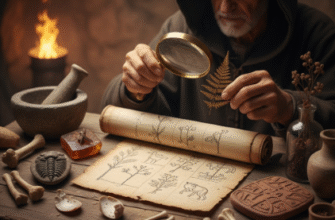The story of human belief is as old as humanity itself. From the earliest flickering campfires where our ancestors gazed at the stars, wondering about the forces that shaped their world, the quest for meaning, purpose, and connection to something larger than ourselves has been a driving force. This innate curiosity and yearning gave birth to the myriad forms of spirituality and organized religion that have profoundly shaped cultures, civilizations, and individual lives across the globe.
Echoes from Prehistory: The Dawn of Belief
Long before written records, archaeological evidence hints at early forms of spiritual expression. Burial sites with carefully arranged bodies and grave goods suggest beliefs about an afterlife or reverence for the dead. Cave paintings, like those found in Lascaux or Chauvet, might depict shamanic journeys or attempts to influence the spirit world for successful hunts. Early human societies likely practiced forms of animism – the belief that spirits inhabit natural objects like rocks, trees, and rivers – and shamanism, where individuals acted as intermediaries between the human and spirit realms, seeking healing, guidance, or control over nature.
Ancestor veneration also played a crucial role, fostering a sense of continuity, identity, and connection to the past. These early beliefs were deeply intertwined with survival, explaining natural phenomena, providing social cohesion, and offering comfort in the face of life’s uncertainties.
Gods and Empires: Faith in Ancient Civilizations
With the rise of agriculture and settled civilizations in Mesopotamia, Egypt, Greece, and Rome, religious systems became more complex and organized. Polytheism – the worship of multiple gods and goddesses – flourished. These deities often embodied natural forces (like the sun god Ra in Egypt or the sky god Zeus in Greece) or human activities and emotions (like warfare, love, or wisdom). Elaborate temples were built, priesthoods emerged as powerful social classes, and intricate mythologies developed to explain the origins of the world, the nature of the gods, and humanity’s place within the cosmos.
Religious rituals, from daily offerings to grand public festivals, were central to maintaining cosmic order, appeasing the gods, and securing prosperity for the community or empire. While diverse, these ancient polytheistic systems often shared a focus on maintaining harmony between the divine and human realms through prescribed actions and worship.
Ancient polytheistic religions were deeply integrated into daily life and governance. Temples often served as economic centers, and rulers frequently claimed divine right or descent. Religious festivals were major social and political events, reinforcing community bonds and state power.
The Axial Age: A Pivot in Human Thought
Roughly between the 8th and 3rd centuries BCE, a period historians call the “Axial Age,” transformative shifts occurred in religious and philosophical thought across different parts of the world. New ideas emerged emphasizing personal ethics, introspection, and a more direct relationship with the divine or ultimate reality. This era laid the groundwork for many of the world’s major enduring religions.
Hinduism: An Ancient Tapestry
Often described as the world’s oldest living religion, Hinduism has roots stretching back thousands of years to the Indus Valley Civilization and the Vedic period. It’s not a single monolithic faith but rather a diverse family of traditions with shared core concepts. Key ideas include Dharma (duty, ethics, cosmic law), Karma (the law of cause and effect, shaping one’s destiny through actions), Samsara (the cycle of birth, death, and rebirth), and Moksha (liberation from this cycle). Sacred texts like the Vedas, Upanishads, Puranas, Mahabharata (including the Bhagavad Gita), and Ramayana provide guidance and narratives. While often perceived as polytheistic due to its vast pantheon of deities (like Brahma, Vishnu, and Shiva), many Hindus understand these as different manifestations or aspects of a single, ultimate reality (Brahman).
Judaism: The Covenant and the Law
Originating among the ancient Israelites in the Middle East, Judaism stands as one of the earliest and most influential monotheistic religions – the belief in one God. Central to Judaism is the concept of a covenant, a special agreement between God (Yahweh) and the Jewish people, beginning with Abraham. The Torah (the first five books of the Hebrew Bible) contains God’s laws and commandments, guiding ethical behavior, religious observance (like the Sabbath), and community life. Despite facing periods of exile and persecution throughout history, Judaism has maintained its distinct identity and traditions, profoundly influencing the later development of both Christianity and Islam.
Buddhism: The Path to Enlightenment
Founded in ancient India by Siddhartha Gautama (the Buddha, or “Enlightened One”) in the 5th century BCE, Buddhism offers a path to escape suffering and achieve enlightenment (Nirvana). The Buddha, after witnessing suffering, sought understanding and discovered the Four Noble Truths: the truth of suffering, the truth of the cause of suffering (desire and attachment), the truth of the end of suffering, and the truth of the path that leads to the end of suffering (the Noble Eightfold Path). This path emphasizes ethical conduct, mental discipline (meditation), and wisdom. Buddhism spread widely throughout Asia, developing into various schools like Theravada and Mahayana, and focuses less on a creator god and more on personal spiritual development and compassion.
Confucianism and Taoism: Harmony in China
Also emerging during the Axial Age in China were two influential philosophical and ethical systems that profoundly shaped East Asian culture. Confucianism, founded by Confucius, is primarily concerned with social harmony, ethical conduct, filial piety (respect for elders and ancestors), righteousness, and proper governance. It emphasizes education and self-cultivation to create a virtuous society. Taoism (or Daoism), associated with the sage Lao Tzu and texts like the Tao Te Ching, emphasizes living in harmony with the Tao (the Way), the natural, underlying principle of the universe. It values simplicity, spontaneity, and non-interference (wu wei), finding balance with the natural world.
Global Religions Take Shape
Christianity: From Jewish Sect to World Faith
Christianity emerged in the 1st century CE in Roman-occupied Judea as a movement within Judaism, centered on the life, teachings, death, and resurrection of Jesus of Nazareth. Christians believe Jesus is the Son of God, the Messiah prophesied in the Hebrew Bible, whose sacrifice offers salvation and reconciliation with God. The New Testament, containing the Gospels (accounts of Jesus’ life) and letters by early leaders like the Apostle Paul, forms the basis of Christian scripture alongside the Hebrew Bible (referred to as the Old Testament). Despite early persecution, Christianity spread rapidly through the Roman Empire, aided by missionary work and its appeal across social classes. It eventually became the dominant religion of the Empire and later branched into major traditions, including Roman Catholicism, Eastern Orthodoxy, and Protestantism (which itself encompasses numerous denominations).
Understanding the historical and theological connections between Judaism, Christianity, and Islam is crucial. These three faiths are often called Abrahamic religions because they trace their origins back to Abraham. They share common prophets, scriptures, and ethical principles, despite significant theological differences.
Islam: Submission to the One God
Islam arose in the Arabian Peninsula in the 7th century CE with the Prophet Muhammad. Muslims believe Muhammad received divine revelations from God (Allah in Arabic), which were compiled into the Quran, Islam’s holy book. The core principle of Islam is submission to the will of Allah. Followers adhere to the Five Pillars: the declaration of faith (Shahada), daily prayers (Salat), charity (Zakat), fasting during the month of Ramadan (Sawm), and pilgrimage to Mecca (Hajj) for those who are able. Islam spread rapidly through conquest, trade, and missionary activity across the Middle East, North Africa, Spain, and parts of Asia. Major branches include Sunni and Shia, differing primarily over the issue of succession after Muhammad’s death.
The Ever-Evolving Landscape of Faith
The history of religion doesn’t stop with the emergence of these major faiths. Countless other traditions enrich the global spiritual landscape. Sikhism, originating in the Punjab region of India in the 15th century, emphasizes belief in one God, equality, service, and ethical living. Jainism, another ancient Indian religion, stresses non-violence (ahimsa) towards all living beings and asceticism. Shinto, the indigenous faith of Japan, involves the worship of kami (spirits) found in nature and ancestors. The Baha’i Faith, originating in 19th-century Persia, teaches the essential unity of all religions and humanity.
The modern era has brought profound changes. The Enlightenment emphasized reason and science, leading to increased secularization in many parts of the world, where religion’s influence on public life declined. Yet, religion remains a powerful force. Globalization has facilitated the spread of faiths to new regions and increased interaction between different traditions, fostering both conflict and interfaith dialogue. New religious movements continue to emerge, adapting ancient beliefs to contemporary contexts or offering entirely new spiritual paths. The search for meaning, community, and transcendence continues, ensuring that the history of faith remains an ongoing narrative, constantly being rewritten by the beliefs and practices of people around the world.
“`






